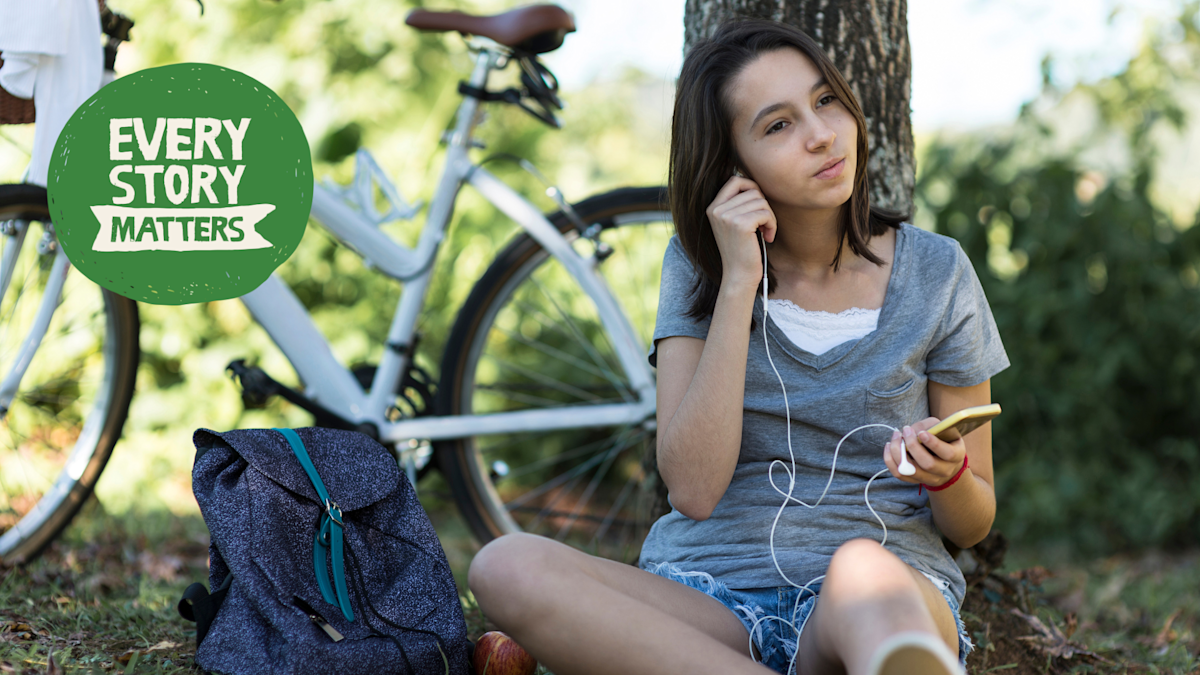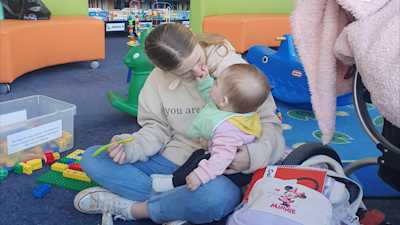Lucy builds the foundational skills she needs to thrive with support from Life Without Barriers Non-Acute Psychosocial Support program.

Image: A teenage girl with shoulder-length brown hair sits on the ground, in front of her bike, listening to music through her headphones. Every Story Matters - Logo.
Trigger warning: Lucy's story talks about mental health and eating disorders. Sometimes words or images can cause sadness or distress, or trigger traumatic memories for people, particularly survivors of past abuse, violence or childhood trauma. For some people, these responses can be overwhelming. If you need to talk to someone, support is available.
You can call Lifeline on 13 11 14 anytime for confidential telephone crisis support.
There are so many drivers of people living in poverty. For 17-year-old Lucy*, the past few years have been beyond tough, but with support from Life Without Barriers Non-Acute Psychosocial Support program (NAPS), Lucy has found her feet and is building a life beyond poverty.
Lucy lives with her mum, brothers, and sisters in community housing. Together they escaped a domestic violence situation and since then, have faced many challenges, including not having enough money to get by.
Lucy has needed medical support due to some barriers she has faced. She was recently diagnosed with malnutrition and a number of mental health conditions. These health issues, coupled with low self-esteem, have made attending school difficult.
Isolated and overwhelmed, Lucy struggled with essential life skills. She did not know how to catch a bus, navigate directions, or schedule appointments. In her family, education was seen as less important than securing a job.
Lucy was referred to Life Without Barriers Non-Acute Psychosocial Support program (NAPS). The NAPS program provides recovery orientated rehabilitation and support services for people living with mental illness aged 16 to 64 years and is aimed at supporting people with mental health conditions who require non-acute psychosocial support to enhance mental wellbeing, improve their level of functioning, and establish longer term community connections.
Beth, a Community Rehabilitation Support Worker from the NAPS program began advocating for Lucy. Beth focused on creating a safe space for Lucy to discuss her home life.
In Lucy's household food was scarce. As the eldest sibling, Lucy often sacrificed her meals for her younger siblings. There were times she had to put her siblings to bed without dinner. When food was available the younger children sometimes neglected Lucy, leaving her hungry and alone.
These challenging home dynamics, particularly regarding food and relationships, contributed to Lucy’s eating disorder and mental health struggles. She also faced various health issues from lack of nutrition.
With Beth’s support, Lucy gained access to an eating disorder clinic and received nutritional supplement drinks both at school and at home. Beth helped her attend health appointments and encouraged Lucy to voice her needs.
Lucy learned how to find a local GP and make her own appointments, while also receiving life skills training, where she learned how to catch a bus, and navigate her surroundings. Beth helped Lucy to access free food services and connect with Centrelink for financial support.
Eager to work alongside her studies, Lucy created a resume with Beth's assistance and bought new clothes for job interviews. Together they practiced for an interview, and Lucy landed a job close to home!
Now, Lucy's confidence is growing. She has gained independence, knows how to order food, and is learning to advocate for herself. Lucy is also successfully managing her job and has shown interest in volunteering at a local animal rescue. With the support from her Community Rehabilitation Support Worker Beth, and the NAPS program, Lucy has built the foundational skills she needs to thrive.
Non-Acute Psychosocial Support
Provided one-on-one in a person’s home and local community, Non-Acute Psychosocial Support (NAPS) is aimed at supporting people with mental health conditions, aged 16 to 64, who require non-acute psychosocial support to enhance mental wellbeing, improve their level of functioning, and establish longer term community connections.
NAPS is delivered from a Recovery Oriented Practise, meaning that an individual is the expert in their life, and we support and coach them to find strategies that work to meet their goals.
Learn more about Non-Acute Psychosocial Support and our Mental Health Services in South Australia.
*Names have been changed to protect the young people in this story.


